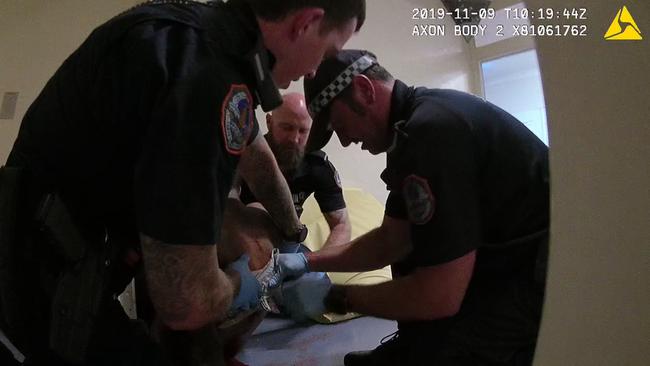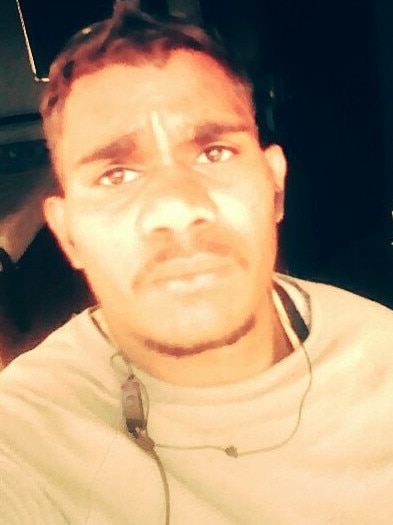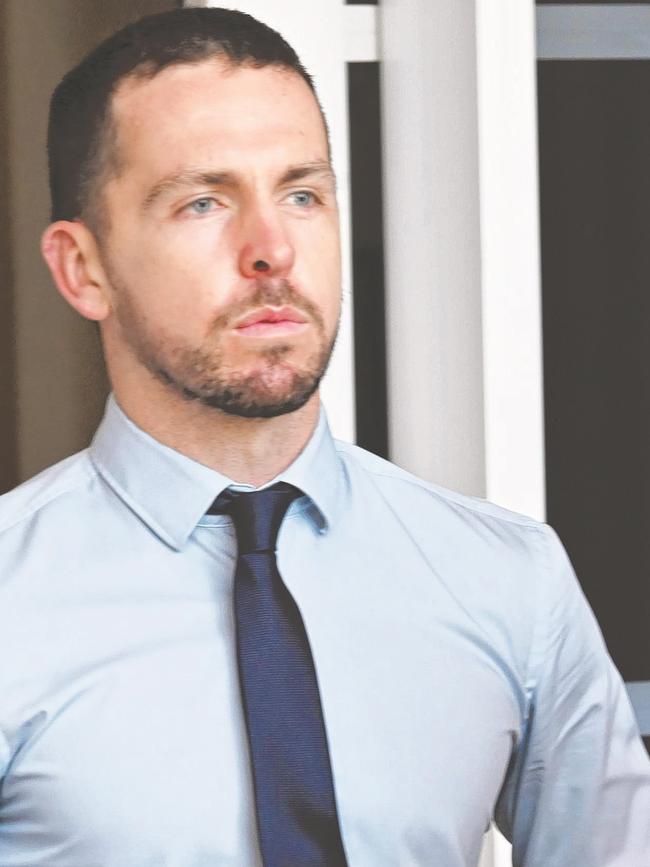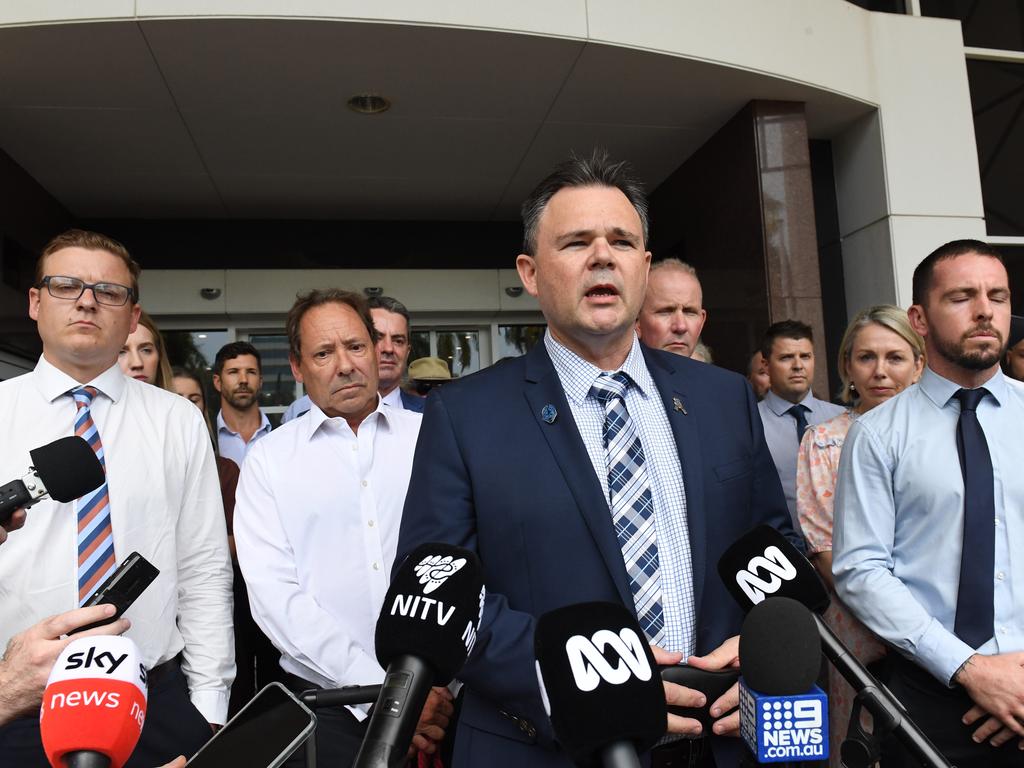Secret terror of nurses who fled community in fear of Kumanjayi Walker shortly before he was shot dead by cop Zachary Rolfe
A spate of terrifying break-ins to nurses’ accommodation forced them to flee Yuendumu in November just hours before police fatally shot Kumanjayi Walker.

The evacuated medical clinic staff were sitting at the Juicy Rump restaurant at Lasseters Casino in Alice Springs when the on-call mobile shrilled.
Yuendumu remote area nurse Cassandra Holland answered – about 7.20pm on Saturday, November 9, 2019 – and, after a pause, her eyes widened in alarm.
She threw the phone to her medical clinic manager, Luana Symonds, and said: “It’s Yuendumu police, someone’s been shot.”
Remote Sergeant Julie Frost, a former nurse herself, was frantic.
“Luana, you’ve gotta send someone,” she blurted.
But they’d all been evacuated from the remote community that morning due to safety fears and were now sitting together at a steakhouse 300km away.
“Julie, there’s no one there,” Symonds reminded her.
“Well, you’ve gotta send someone!” Frost replied.
“We need someone now! Police have shot a community member.”
Then the line went dead.
Three days earlier, on the Wednesday, Symonds’ home had been ransacked. On Thursday night her car windscreen was smashed while parked outside the clinic.
So, on Friday morning Symonds and husband Lance – who worked for the Department of Health as a cleaner, gardener and driver – drove to Alice Springs to have it fixed. As soon as they left, offenders tried to break into their house again, as well as the house next door.
On Friday night, remote area nurse Vanessa Watts – who lived in a row of attached units occupied by the medical staff – woke to offenders trying to break into her home. She could hear assailants trying to remove security screens from the adjacent unit. Then she heard glass exploding outside another unit, near a colleague’s bedroom. She tried to call the nurse inside and when she couldn’t get through, called police.
They arrived about 20 minutes later but the offenders jumped the fence and ran off.
Officers seized the abandoned shovels, pick axes and weapons strewn around the yard.
The explosion turned out to be Parau Riwaka’s car window shattering. Parau was the husband of midwife Janine.
Around the same time, young graduate nurse Matilda Starbuck, who lived alone in the end unit, was also waking to terrifying sounds. Starbuck got up and ran to Janine’s house where she, Watts, and the Riwakas sat up together until daylight, too scared to sleep or go home.
Meanwhile, in a gated compound around the corner, boys were trying to pull sheets of iron off the roof of nurse Lisa Meredith’s home while she was awake inside. From her window, Meredith could see kids in the backyard of nurse John Alting trying to break in through his back windows.
The next morning – Saturday, November 9 – Watts was supposed to go on-call but after a sleepless night Holland offered to cover for her until she had got some rest.
Holland notified a manager in Alice Springs, who notified the executive on-call, Helen Gill, about the break-ins.
“They were in their houses with their lights turned on and they could hear people trying to screech the … trying to gain access to their property, even though they were yelling at them,” Holland later told detectives investigating the death of Kumanjayi Walker.
“People were trying to break into their property knowing that they were awake. That’s scary. That’s really scary.”
Later that morning, Gill, Symonds and the Yuendumu health staff all dialled into a teleconference. The nurses’ homes had been regularly broken into for at least six months.
“Ideally, you would sit down and have a meeting with (local elders) but this had escalated past that because that had failed over previous weeks,” Holland said.
“This had been going on, had been building up for weeks.”
The medical staff were scared and annoyed, so their bosses at NT Health – increasingly worried about employee safety and unable to protect them – abruptly pulled them out of the troubled community.
Some nurses were reluctant to leave their homes due to the inconvenience and disruption it caused.
Holland, who felt safe in her unit, wanted to stay “on principle”.
“I was definitely keen on staying,” she told detectives. “I do not agree with nurses leaving communities. I believe in nurses’ safety but have a real issue with leaving.
“Nurses don’t go on strike, we don’t leave patients, it’s an absolute rule of thumb. I’m a very old-school nurse and I have real issues doing that.”
The clinic staff had talked about evacuating before, though.
“They have threatened it before in relation to, or in response to, unlawful entries,” Frost told detectives.
“But they haven’t actually left it high and dry like that. They’ve never left it unmanned totally, in my experience.”
By 11am the NT Health executive had decided that the medical staff had to leave.
“We were definitely all advised at this stage to leave,” Holland said.
“There was no question. We were told to go home, pack up and leave. And get out as soon as possible. We had no choice.”
The nurses who were on call that weekend – Holland and Watts – were told to inform as many of the 1000 community members as possible.
Holland, who was by this time treating patients at the clinic, informed her patients’ relatives and the next patient, an elder, of the situation.
“I don’t recall exactly who I spoke to but it was two elders,” she told detectives. “The elders said they would speak to the other elders and raised remorse that the nurses felt unsafe.
“There was no animosity, it was just ‘oh dear this is bad’. That’s how they were taking it.”
All of the nurses then met at Watts’s house to co-ordinate their departure.
Parua Riwaka, who was involved in community engagement, told Holland to tell community elders Jimmy Langdon and Eddie Robertson – the grandfather of Arnold Walker’s girlfriend, Rickisha Robertson – that they were leaving.
An Indigenous health worker from the clinic pulled up at Janine Riwaka’s house asking what was going on because “he’d heard rumours”.
“In community, you have to realise that we have almost the bongo drums,” Holland said.
“It’s like they know exactly where we are, they know what we are feeling and they don’t need the internet to know what’s going on in community. Information just diffuses really quickly.”
Holland and Alting then drove to Langdon’s house but he wasn’t there.
“I told Jimmy’s family that we need to speak to him and the other elders because the nurses are pulling out of the community … because the break-ins were escalating and the community was refusing to help police bring out the culprits,” Holland said.
“They knew all the culprits but family moved them around from house to house for their safety. That’s what they do.”

The pair then tried to find Robertson but couldn’t. Soon after, his upset son, Robbie Robertson, called Holland, insisting they could not leave because a funeral was taking place at 2pm.
Holland decided she and Watts would stay until Robbie collected the body from the morgue while the rest of the health staff convoyed out.
Holland called the police station and asked to leave an ambulance in their yard so it wouldn’t be vandalised.
“I offered to give (the ambulance keys) to Julie – the station sergeant – and she said ‘no, no we don’t want the keys at all’,” Holland said.
“So, I took them back to the clinic and told her that we would be locking them up in the clinic and the keys to the clinic would be with the Yuelamu staff.”
But before Holland left, Frost mentioned Walker.
“I could see her level of fear and frustration regarding this individual,” Holland told detectives. “We had a conversation on that day (November 9) and she told me how scared she was of him.”
Holland had herself encountered Walker before.
“I have met him only once during issues with another patient and he stood out from the crowd,” she said.
“And this person is not, I didn’t appreciate reading in the papers that he was a 19-year-old teenager. He was a man and he was a very scary man. I recognise him as someone in the crowd that I wouldn’t want to tangle with.”
At 2pm, Holland was still waiting for the body to be collected from the morgue so she rang Robbie Robertson, who said the funeral would now be at 4.30pm.
The nurses did not want to wait so Holland drove to the basketball courts to sort out a solution with him in person. She offered to leave the morgue door unlocked so he could access the body later that afternoon.
“They were satisfied,” she said. “But when I was leaving the basketball courts I had quite a group of people go around the ambulance and they were yelling at me not to take the ambulance.
“The locals said ‘you can’t leave, you can’t take our ambulance’. Yes, everything is ‘theirs’.
“My personal safety at that stage was under concern, so we just continued driving.”
In case of emergency
Yuendumu medical clinic normally has eight remote area nurses, a midwife, two graduate nurses and their mentor.
The clinic staff provide primary healthcare, child healthcare and chronic disease management to an Indigenous community of about a thousand Warlpiri people.
Remote area nurses are highly trained – having completed further training than a registered nurse – and are equipped to treat most medical emergencies including gunshot wounds.
The nurses don’t do surgical intervention but they can limit blood loss.
The clinic does not have a ventilator but the staff are capable of keeping patients on life support until the Royal Flying Doctor Service arrives.
“We are talking at least two hours for an extremely critical evacuation,” Holland said.
“Realistically, we are talking two hours from the incident to having doctors on the ground.
“You’re probably 3½ hours before the patient sees a surgeon.”
That left just the two nurses at the tiny community of Yuelamu – Lorraine Walcott and Heather Zanker – who were at least an hour away by road.
‘Two hours late’
At 7.25pm, while trying to arrange a medical air retrieval plane, Frost called the Yuelamu Clinic and asked Walcott, the clinic manager, how fast they could get to Yuendumu.
“Lorraine, I need you here right now, we’ve had a police shooting,” Frost said.
Police needed urgent medical assistance for Walker, who had been shot and was now being treated at the back of the station.

Walcott, 62, said she and Zanker would leave immediately but could only drive as fast as the ambulance could go on the outback roads.
Taking an ambulance on the unsealed back road at night was dangerous so when they left the Yuelamu clinic at 7.50pm they headed out to the Tanami Highway, where they could travel at 100km/h.
Emma from St Johns called the nurses’ on-call mobile, just before it lost signal coverage, and said she wasn’t sure it was safe to proceed to Yuendumu. As soon as she said it, the call then dropped out so the nurses kept driving.
More than an hour later their headlights pierced the darkness as they neared Yuendumu.
As their vehicle approached the police station, the crowd gathered outside yelled at them: “You’re f..king late! You’re two hours late!”
An Aboriginal man approached the ambulance and Zanker wound down the passenger-side window.
“It’s all right, I’m a copper,” Aboriginal community police officer Derek Williams said.
He directed them to the back gate of the police station. They were let inside the police compound at 9.08pm. Frost came out to the carpark and told them the patient had died.The nurses could hear the community yelling outside. Walcott went back to the ambulance and turned it around in case the nurses needed to make a quick exit.
Once inside the watch house, the nurses gloved up and listened to Walker through the stethoscope. There was no heartbeat. His pupils were fixed and dilated.
At 9.28pm the nurses declared Walker deceased.
Nurses ‘blamed’
The morning after the shooting, NT Health staff met at the Peter Sitzler Building in Alice Springs where they were updated on the situation in Yuendumu. The nurses had heard that the community blamed them for Walker’s death because they weren’t there to treat him.
The nurses asked if they could send a delegation back to Yuendumu to talk to the locals but their bosses said no. They would send other nurses to Yuendumu until tensions calmed.
On the morning of Monday, November 11, the nurses met again and were told the community elders had decided that all of the Yuendumu nurses, except Holland, could return.
They were apparently angry at Holland for having not informed every single person in the community, individually, that the medical staff were leaving.
So, all of them, except Holland, headed home to Yuendumu.
During one of the meetings in Alice Springs, NT Health assured its medical staff their accommodation had been checked and that it was now secure.
But when the nurses returned to Yuendumu, Symonds discovered her home – and the house next door – had been burgled again.
Upon arrival, medical staff then attended a “confronting” and “overwhelming” community meeting, where locals directly blamed the nurses for Walker’s death.
“The community and the community representatives definitely blamed us,” Symonds told detectives.
“Even though the Yuelamu nurses did respond, it was the timeliness of the response that they were angry at.
“And they felt that if we were there that maybe that life could have been saved.
“So, yeah, definitely anger directed at the Health Centre but (also) directly at me.”
‘Nasty place to be’
Nurses say break-ins and vandalism have been happening at Yuendumu for several years.
The nurses had no idea why the clinic and their homes were constantly targeted but security at their Territory Housing accommodation was poor.
“Considering what Health does for these people and they desperately need the health services, we’re unsure,” Holland told detectives investigating Walker’s death.
“There’s never been an incident where someone was badly treated by Health. In fact, it’s quite the opposite. In Indigenous areas we bend over backwards to assist them.”
Holland, who has 40 years of nursing experience, said remote area nurses provided care above and beyond that which is offered in other areas.
“We are interested in the family situation, we are interested in housing security, we are interested in food security, whether the children are cared for, lots more,” she said. “You get far more personally involved and so that’s why we’ve never (traditionally) been targeted.”
The break-ins occurred in waves, usually after an offender or group of offenders had been released from juvenile detention and returned to the community.
“They would come back into town and they were gathering up in little groups to cause havoc,” Holland said.
“It was just a constant feeling of break-ins and being unsafe.
“And I’ve never seen nurses’ houses targeted anywhere else.”
Holland, who has extensive experience in Aboriginal care, had been working in remote communities around Australia – including Cape York, The Gulf and Arnhem Land – for five years prior to the shooting.
But she had never seen medical staff evacuated before. Not even during riots like those she experienced while working at Canteen Creek. But in Yuendumu, the danger felt palpable.
“You don’t walk around, you don’t go to the shop, you don’t do anything that puts your personal safety at risk,” she said.
“I have had a lot of experience. I’m well trained in personal protection and it (living in Yuendumu) scared the crap out of me.”
Holland told detectives she had been verbally and physically threatened while working in the community.
“It’s the most aggressive area I’ve ever worked and I’ve worked in jails,” she said.
“It’s the first time I’ve felt aggression towards the nursing staff who are helping the people.
“It was almost considered part of our job and it was really quite ridiculous.”
Holland said she had never feared for her personal safety like she did in Yuendumu.
“It’s just a nasty place to be,” she said.
“And I feel great sympathy for the police because it’s just awful.
“I will never go back to Yuendumu.”
• Watch our exclusive Zachary Rolfe interview and documentary – and read all our coverage – at theaustralian.com.au or the app.
• Hear all the news and analysis in our daily podcast Yuendumu: The Trial, available by searching ‘Yuendumu’ wherever you get your podcasts.






